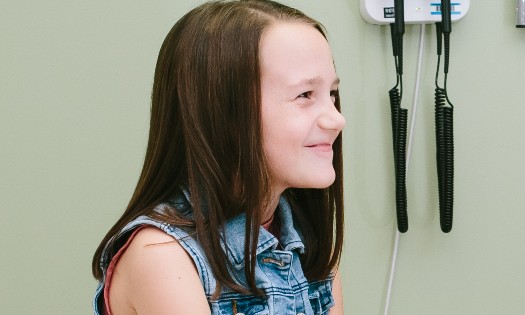Nephrotic syndrome (NS) is one of the most challenging conditions in pediatric nephrology. The condition is rare – two to seven cases per 100,000 children – and the mechanisms are poorly understood. Making matters worse, treatment options are limited, and it’s impossible to predict if a patient will respond to a particular therapy.
At Children’s Health℠, we recognize how difficult NS treatment can be for children and their parents. That’s why we’re committed to offering the latest approaches – and working to improve them through research.
A Resilient Approach
When children are referred to her for NS, Elizabeth Brown, M.D., Pediatric Nephrologist at Children’s Health and Assistant Professor at UT Southwestern, begins a sometimes challenging treatment protocol. “You have to try out different medications to see what a patient responds to,” Dr. Brown says. “That can be very frustrating for kids and their families.”
After a diagnosis through blood and urine tests, most children start a three-month course of corticosteroids, usually prednisone. Up to 80 percent of children achieve remission after four weeks of therapy. However, 60 to 70 percent of those kids will eventually relapse.
“It’s devastating for families because your kid may have responded to the medicine, even come off it. And then, suddenly, they have protein in their urine and have to go back on prednisone,” Dr. Brown says.
If children are frequently relapsing, immunosuppressive therapies like tacrolimus or mycophenolate mofetil are the next option. These treatments can prolong the time between relapses, rather than actively putting patients into remission, but need to be taken every day for several years. If these medications are not effective, the next step for some patients is to use a stronger IV immunosuppressive medication called rituximab.
The Need for New Treatments
Although corticosteroids, such as prednisone, are effective for most patients, the adverse effects of long-term corticosteroid use are challenging and potentially long-lasting: weight gain, emotional and behavioral changes, and an increased risk of diabetes, bone abnormalities and osteoporosis. Long-term immunosuppression can also increase the risk of infections.
And then there’s the small percentage of children who have “steroid-resistant NS” and don’t respond to any treatment. Many will progress to end-stage renal disease that requires dialysis and transplant. Kids with some forms of nephrotic syndrome also have a high risk of relapse after transplant. This can be very difficult to treat and sometimes leads to loss of the transplanted kidney.
Multicenter Research Collaborations
Fortunately, Dr. Brown and her colleagues are involved in NIH-sponsored studies that aim to better understand NS and transform treatment:
The Nephrotic Syndrome Study Network (NEPTUNE) is a multicenter collaborative consortium dedicated to advancing the understanding and treatment of NS. Since 2010, the consortium has collected blood, urine and kidney biopsy samples from more than 600 participants. Researchers aim to better understand the mechanisms of NS and how the condition evolves over time. Their findings could open the door to precision medicine treatments.
Cure Glomerulonephropathy (CureGN), a multicenter five-year cohort study of 2,400 children and adults with NS and other glomerular diseases. Like NEPTUNE, CureGN aims to better understand the disease trajectory and identify biomarkers linked to glomerular diseases.
We’re also one of a handful of pediatric centers participating in the Phase 3 DUPLEX study of sparsentan – a dual-acting angiotensin and endothelin receptor antagonist. Phase 2 results were promising: patients saw a 45 percent reduction in proteinuria after taking sparsentan for eight weeks.
“Having multicenter consortia like NEPTUNE and CureGN conducting observational trials has really changed the field,” Dr. Brown says. “It brings people together to talk about NS and brainstorm solutions. We’re making progress toward a day when we can offer personalized and more effective therapies to NS patients.”
To learn more or refer a patient, visit childrens.com/nephrology or call [214-456-9933](tel: 214-456-9933).



